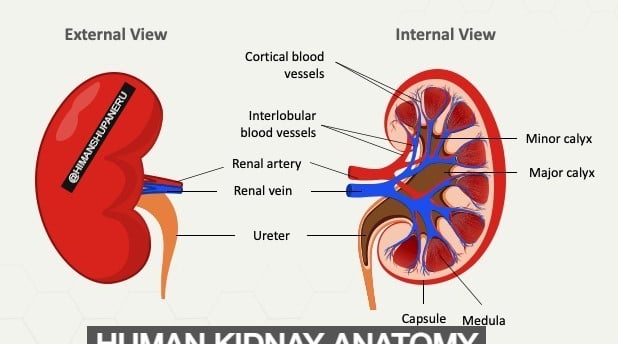online learning with Doc note master|| Himanshu paneru
Human Kidney
The human kidney is a vital organ responsible for maintaining the body's internal balance by regulating water and electrolyte levels, filtering waste products, and producing hormones. There are two kidneys in the human body. Each kidney contains approximately one million nephrons, the functional units responsible for filtering blood and forming urine.
BIOCHEMISTRY
1/4/20241 मिनट पढ़ें


HUMAN KIDNEY
Kidneys are vital organs found in the human body.
The kidneys play important role in maintaining the body's overall health and homeostasis.
Each kidney is made up of millions of tiny functional units called nephrons.
Nephrons are responsible for filtering the blood and producing urine.
Kidney produce hormones such as erythropoietin which stimulates the production of red blood cells (RBC) in the bone marrow.
Kidney is responsible for various job in the body.
ANATOMY & PHYSIOLOGY OF KIDNEY
# LOCATION OF KIDNEY:
Located on both sides of the spine, below the rib cage.
# POSITION OF KIDNEY:
Kidney are positioned high in the abdomen, just below the diaphragm.
# STRUCTURE OF KIDNEY:
Kidneys are bean-shaped and approximately the size of a fist.
# BLOOD SUPPLY OF KIDNEY:
Kidney receive blood through the renal arteries.
Blood is filtered and purified within the kidneys before being returned to circulation via the renal veins.
FUNCTION OF KIDNEY
1. Filtration :
The primary function of the kidneys is to filter waste products, excess water, and toxins from the bloodstream.
2. Electrolyte Balance:
The kidneys also regulate the concentrations of electrolytes such as –
Sodium
Potassium
Calcium
Magnesium
Phosphate
3. Acid-Base Balance:
The kidneys play a crucial role in maintaining the acid-base balance (pH) of the body. It ensuring that the pH of bodily fluids remains within a narrow range.
4. Blood Pressure Regulation:
The kidneys are involved in regulating blood pressure.
They produce a hormone called rennin. The rennin activates the renin-angiotensin-aldosterone system (RAAS).
5. Hormone Production:
Kidneys produce hormones like erythropoietin (EPO) that stimulate red blood cell production.
6. Vitamin D Activation:
The kidneys are involved in converting inactive vitamin D into its active form.
